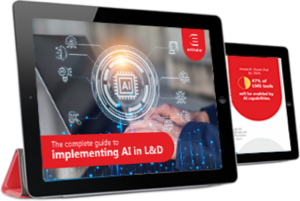How to Fool-proof Learning Assessments with AI Proctoring

Online assessments have become an important part of employee learning and development across industries, offering flexibility and ease of access for both organizations as well as candidates. Yet, upholding the integrity of these assessments could pose a major challenge.
This is where a technology like AI proctoring comes into the picture, transforming the process of monitoring assessments and ensuring the trustworthiness of online evaluations.
In this blog we look at AI-driven proctoring technology, its key benefits for assessing employee skills reliably and certain considerations to take into account while deploying this technology through your learning platform.
What is AI Proctoring
AI proctoring, also known as remote proctoring, uses advanced artificial intelligence to oversee assessments in real-time. Moving away from conventional approaches, AI proctoring provides a scalable solution to uphold the integrity of assessments from a distance.
In fact, AI proctoring has become an increasingly preferred innovation in areas like employee skill evaluations, especially since the pandemic when remote working became the norm for organizations across industries.
The technology empowers L&D teams to better manage the standard of assessments in a manner almost similar to that of in-person exams. While guaranteeing assessment authenticity, AI Proctoring is also a convenient and efficient solution that saves time and resources for test-takers as well as L&D.
A Smart Solution for Assessment Integrity
When it comes to skill-based evaluations for employees, AI Proctoring can be a key tool within learning platforms like Learning Experience Platforms (LXP) and Learning Management System (LMS).
Let’s look at the various ways in which AI Proctoring can be used to enhance integrity of assessments:
Facial Recognition: Using AI algorithms, live video feeds can be analyzed to compare the user/learner’s facial features with their photo. Any discrepancies detected prompt the system to alert the proctor, enabling timely intervention and investigation.
Biometric Authentication: AI can employ biometric data like fingerprint or voice recognition to authenticate the user’s identity prior to granting access to the assessment.
Plagiarism Detection: Using AI, the user’s work can be compared to various online sources to pinpoint any instances of plagiarism.
Advanced Monitoring: AI has the capability to simultaneously monitor multiple users or the instances of user leaving the screen, enabling detection and intervention in cases of collusion or cheating.
Mobile Phone Usage: AI Proctoring has the capability to detect when users attempt to access test content using their cell phones. This protection is extended to tablets as well.
Comprehensive Reports: The reports highlight any suspicious behaviours, including images of anomalies, screen recordings, and snapshots from the proctoring session, all accompanied by an integrity score.
Advantages of AI Proctoring in Learning Environments
Upholds Assessment Integrity
One of the biggest advantages of AI proctoring is that it helps L&D teams in mitigating instances of dishonest user behavior, thereby ensuring that assessment outcomes accurately reflect the candidates’ knowledge and skills. With the help of video and audio surveillance coupled with advanced algorithms, AI proctoring can identify various suspicious indicators of dishonest conduct, including gaze direction, speech analysis, the presence of unauthorized individuals or materials, and more.
This not only enables vigilant monitoring during assessments but also acts as a deterrent, prompting candidates to reconsider before attempting to breach regulations. Thus, AI proctoring not only guarantees proper assessments but also creates a learning environment that is grounded in trust, a seminal aspect in the era of online learning.
Enhances Accessibility for Learners
The essence of online learning lies in its ability to offer flexibility and accessibility to learners worldwide. AI proctoring acts as a facilitator, empowering organizations and their L&D teams to expand their assessment reach confidently.
Learners can now undertake assessments from the comfort of their homes or any other preferred location, provided they have a stable Internet connection. This obliterates the need for physical supervision in specific locations, thereby extending learning opportunities to even people who are facing geographical or physical constraints.
Adapts and Advances Fast
The synergy between data and AI creates an atmosphere where potential breaches and irregularities undergo meticulous scrutiny. Insights from human proctors, input from instructors and data sourced from the platform come together to fuel the continuous learning trajectory of AI, enhancing its analytical power.
Specifically customized to the needs of each organization, the feedback loop empowers the proctoring system to be tailor-made, spotlighting important factors while leaving out unnecessary nuances. AI’s adaptive capabilities enables it to maintain a balance, reducing undue false alarms and minimizing unwarranted disruptions.
Improves Assessment Efficiency
The advanced features of AI Proctoring are reshaping the assessment landscape, providing a valuable solution for L&D teams grappling with increasing workloads. Thanks to automation of processes, there is no need to invest in additional staff to keep a watch on assessments, thereby reducing costs. The time saved can be redirected towards other critical aspects of learning.

The Complete Guide to Implementing AI in L&D
- Top AI considerations
- Benefits of AI-powered learning
- Future of AI in L&D
Key Considerations in Selecting an AI Proctoring Solution
When choosing an AI proctoring solution, L&D teams should prioritize some key aspects:
Flexibility: It helps to look for a solution that is flexible enough to accommodate the specific needs and preferences of various assessments within the organization, facilitating adaptable implementation.
Precision and Reliability: Ensuring that the AI proctoring solution offers precise and dependable monitoring of assessment sessions is key in order to minimize both false positives and negatives.
User-Friendliness: It is important to look for a platform with a user-friendly interface that is intuitive for both instructors and users to navigate, reducing the need for extensive training or support.
Integration Capabilities: Checking the compatibility of the solution with existing learning platforms is necessary to enable seamless integration into organizational workflows and to streamline processes.
Privacy and Security: Ensuring adherence to data protection regulations and robust security measures is a key step to safeguard sensitive information and to prioritize the safety of all stakeholders involved.
Best Practices for Implementing AI Proctoring
Effective deployment of AI Proctoring demands careful planning. Some critical strategies include:
Policy Development: L&D teams need to formulate transparent policies and guidelines clearly outlining expectations for test-takers, instructors and administrators.
Training and Support: Offering thorough training sessions for instructors, administrators and test-takers to ensure proper use of proctoring system is important.
Pilot Testing: L&D teams can conduct preliminary tests to assess the efficacy of the AI Proctoring solution and address any required adjustments before full-scale implementation.
Conclusion
By leveraging advanced technologies like AI Proctoring, L&D teams can conduct secure and reliable assessments all while ensuring a smooth experience for learners.
With an increasing demand for online assessments, AI proctoring is becoming a critical tool for assessment integrity across various industries and is poised to continue playing an important role in the future.











